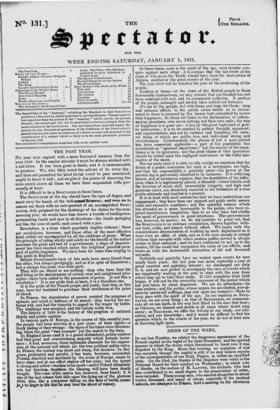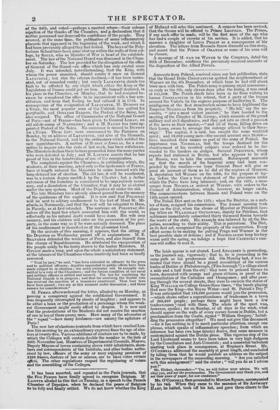NEWS OF THE WEEK.
IN our last Number, we related the dangerous appearance of the French capital on the night of the 22nd December, and the spirited manner in which the storm which threatened to burst over it was dispelled by the King. Since that evening, no symptom of riot has occurred, though the capital is still, if we may believe reports of the correspondents of our Daily Papers, in rather an unsettled state. On the 23rd, the thanks of the Deputies were voted to the National Guard for their conduct on Wednesday; in which vote of thanks, on the motion of M. LAFITTE, the students, who had also contributed in no small degree to the preservation of order, were included. These young men, who amount altogether to about twelve thousand, and many of whom, especially of the medical schools, are strangers to France, held a meeting on the afternoon of the 24th, and voted—perhaps a merited return—their solemn rejection of the thanks of the Chamber, and it declaration that it neither possessed nor deserved the confidence of the people. They avowed, at the same time, the publication of some inflammatory placards that appeared in the beginning of the week, and which it had been previously alleged they had denied. The boys of the Poly- technic School have been since shut up within the walls of their col- lege, by SOULT, who as Minister of War is head of the establish- ment. The law of the National Guard was discussed in the Cham- ber on Saturday. The law provided for the abrogation of the office of General of the Guard—an office which has only existed since July. It was intended, notwithstanding, that the King, with whom the power remained, should confer it anew on General LAFAYETTE ; but this the veteran declined,—it has been insinu- ated, out of wounded vanity ; but surely LAFAYETTE stands too high to be affected by any slight which either the King or the Legislature of France could put on him. He himself declared, in his place in the Chamber, on Monday, that he had resigned be- cause he considered the office to be inconsistent with a free con- stitution, and from that feeling he had refused it in I 7..)3. In consequence of the resignation of LAFAYETTE, M. DUPONT DE I:EfIRE, the most popular man of the Cabinet, has quitted his pOrtfeuille, and ODILLON Barritor, the Prefect of the Seine, has also resigned. The office of Commander of the National Guard of Paris—not of France—has been given to General LOBAU, an old aid-de-camp of NAPOLEON; and a M. BAUDE has been ap- pointed Prefect of the Seine. No successor is named to DUPONT DE L'EURE. These facts were announced to the Parisians on Sunday, by an address of LAFAYETTE, and also of the Monarch, to the National Guard, and by the ordinances which notified the new appointments. A motion of BOISSY D.ANGLA.S, for a com- mittee to inquire into the riots of last week, has been withdrawn. The Ministers declare them to have proceeded from the same parties who were defeated in July ; and M. LAFITTE asserts that lie has proof of this in the handwriting of one of the conspirators. The complaints against the Chambers, in publishing which, the students, at their meeting, acted only as the spokesmen of France, have at length induced the Ministers to come forward with the long-delayed law of election. The old law, it will be recollected, was to a certain degree modified by the Charter ; but a farther extension of the franchise is considered to be imperatively neces- sary, and a dissolution of the Chamber, that it may be re-elected under the new system. Most of the Deputies sit under the old.
The late Ministers have already almost passed from the memory of the quidnuncs of the capital. It is now said that POLIGNAC will be sent to solitary confinement to the fort of Mont St. Mi- chaels, in Normandy, and that the rest will be relegated to Ham, in Picardy, as at first intended. The sentence on POLIGNAC dis- solves all the legal ties which connected him with the world, as effectually as his natural death would have done. His wife may remarry, and his children will enter on the possession of his pro- perty, in the same way as if he were actually deceased. The place of his confinement is described as of the gloomiest kind. By the arrivals of this morning, it appears, that the sitting of the Deputies on Wednesday passed off in explanations. M. E. SALVERTE defended the workmen of Paris, and also himself from the charge of Republicanism. He attributed the exasperation of the people solely to the lenity shown to the traitor Ministers. M. GUIZOT made a long, and upon the whole a satisfactory statement, of the labours of the Chambers whose inactivity had been so loudly censured.
"Trial by jury," he said, "has been extended to offences by the press and to political offences; deputies appointed to public offices have been made subject to re-election ; the army estimates will be annually sub- mitted to a vote of the Chambers ; and the future condition of our naval and military officers is settled and secured. The law for regulating the National Guards is in progress ; and that for receiving the double vote has received the sanction of a transitory enactment. Thus four laws have been passed ; two are at this moment under discussion ; and three remain for consideration."
M. PERSIL afterwards read the letter, alluded to on Monday, as proving a conspiracy against the established Government. It was frequently interrupted by shouts of laughter ; and appears to be either a hoax or the production of a personage whom the weak- est Government might easily afford to despise. It is now said that the protestations of the Students did not receive the sanction of one in ten of these young men. How many of the advocates of the " repeal"—how many Irishmen—are among the agitators of Pans?
The new law of elections (extracts from which have reached Lon- don this morning by an extraordinary express) fixes the age of elec- tors at twenty-five. Various additions of electors are to be made, by -which the Colleges will contain double the number in the lists of 30th November last. Members of Departmental Councils, Mayors, Deputy Mayors of towns containing above 6000 inhabitants, mem- bers and correspondents of the Institute, and other bodies autho- rised by law, officers of the army or navy enjoying pensions of 1200 francs, doctors of law or science, are to have votes virtute *ed. The other regulations respect the registering of voters and the assembling of the Colleges.































 Previous page
Previous page